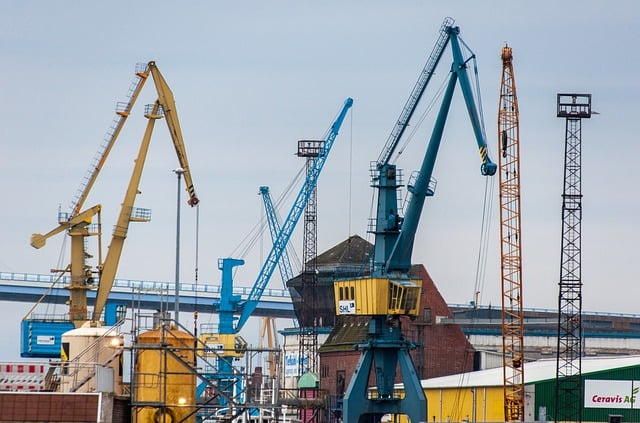Blockchain-based Supply Chain Traceability

Are you curious about how blockchain technology is transforming supply chain traceability? Well, get ready to be amazed as we dive into the world of blockchain-based supply chain traceability and explore its fascinating potential. Imagine a transparent and secure system that allows you to track every step of a product’s journey, from its origin to your hands. That’s precisely what blockchain brings to the table.
Blockchain, often associated with cryptocurrencies like Bitcoin, is a decentralized digital ledger that records transactions across multiple computers. But it’s not just limited to financial transactions; its applications extend far beyond. One such application is revolutionizing supply chain management through enhanced traceability.
In traditional supply chains, tracing the origin and movement of goods can be a daunting task. However, with blockchain, it becomes a breeze. By leveraging its inherent immutability and transparency, blockchain ensures that every transaction and data entry is securely recorded and cannot be tampered with. This creates an unalterable trail, providing an unprecedented level of trust and accountability.
But how does blockchain achieve this? The answer lies in its distributed nature. Instead of relying on a central authority, blockchain operates as a network of interconnected nodes. Each node stores a copy of the entire blockchain, ensuring that no single entity has control over the data. This decentralization makes it nearly impossible for malicious actors to manipulate or corrupt the information.
In the context of supply chain traceability, blockchain allows for seamless tracking of products at each stage. Let’s take an example: imagine purchasing a piece of clothing. With blockchain-based traceability, you can scan a QR code on the garment and instantly access information about its materials, manufacturing process, and even the source of raw materials. You can verify if the garment was made using sustainable practices or if it meets certain quality standards. This empowers consumers to make informed choices aligned with their values.
Furthermore, blockchain also facilitates swift identification and mitigation of issues such as counterfeit products, product recalls, or supply chain disruptions. By quickly tracing the problem to its source, companies can take immediate action, ensuring customer safety and minimizing financial losses.
Blockchain-based supply chain traceability is a game-changer. It enhances transparency, trust, and accountability throughout the supply chain, benefiting both businesses and consumers. With blockchain, we enter an era where every product tells a story, and every transaction leaves an indelible mark. So, next time you purchase a product, remember that blockchain is silently revolutionizing the way it reaches your hands, making the supply chain a truly remarkable journey.
Revolutionizing Transparency: Blockchain Technology Empowers Supply Chain Traceability
Have you ever wondered about the journey of a product from its inception to your doorstep? The complex web of processes involved in bringing goods to consumers is often shrouded in mystery. However, thanks to the emergence of blockchain technology, a new era of transparency and traceability is upon us.
Blockchain, originally created as the underlying technology for cryptocurrencies like Bitcoin, has found applications far beyond the digital currency realm. One such application is revolutionizing supply chain management, offering unprecedented levels of transparency and accountability.

Imagine a world where you could track every step of a product’s journey, from raw materials to manufacturing, distribution, and even disposal. Blockchain makes this possible by creating an immutable and decentralized ledger that records every transaction across the supply chain. This distributed nature of blockchain ensures that no single entity has control over the data, making it resistant to tampering and fraud.
With blockchain-enabled supply chain traceability, companies can provide real-time updates on the origins, quality, and handling of their products. This empowers consumers to make informed choices based on verifiable information. Are you concerned about the ethical sourcing of your coffee beans or the authenticity of your luxury handbag? Blockchain allows you to access detailed information about the origins of these products, ensuring transparency and accountability.

Moreover, blockchain technology enhances efficiency and reduces costs in supply chain management. By eliminating intermediaries and streamlining processes, businesses can optimize their operations and reduce the risk of errors and delays. Smart contracts, another feature of blockchain, automate and enforce contractual agreements, further enhancing trust and reliability in the supply chain.
The impact of blockchain technology on supply chain traceability extends beyond consumer benefits. It enables companies to identify bottlenecks, analyze patterns, and improve overall performance. By having a complete and accurate record of transactions, businesses can enhance quality control, streamline logistics, and respond effectively to emergencies such as recalls or product defects.
Blockchain technology is revolutionizing supply chain traceability, bringing much-needed transparency and accountability to the global marketplace. It empowers consumers to make informed choices, enhances operational efficiency for businesses, and fosters trust among stakeholders. As we embrace this transformative technology, the future of supply chains holds immense promise for a more transparent and sustainable world.
From Farm to Fork: How Blockchain Ensures Trust in the Food Supply Chain
Have you ever stopped to think about how the food on your plate made its way from the farm to your fork? The journey might seem simple, but the reality is that the food supply chain is a complex web of processes and intermediaries. With so many players involved, ensuring trust and transparency becomes paramount. This is where blockchain technology comes into play, revolutionizing the way we track and authenticate food products.
So, what exactly is blockchain? Think of it as an immutable digital ledger that records transactions across multiple computers. Each transaction is added to a “block” and linked to the previous one, forming a “chain.” This decentralized nature eliminates the need for a central authority and makes it nearly impossible to alter or tamper with the recorded data. Now, imagine applying this technology to the food supply chain.
One of the major challenges in the food industry is traceability. In case of a foodborne illness outbreak or a product recall, it can take days, if not weeks, to identify the source and remove the affected products from circulation. Blockchain solves this problem by providing end-to-end traceability. By recording every step of the supply chain on the blockchain, from the farm where the ingredients are grown to the processing facilities, distribution centers, and ultimately, the retail stores, we can quickly pinpoint the source of any issue and take immediate action.
Moreover, blockchain enhances transparency, allowing consumers to access detailed information about the journey of their food. Imagine scanning a QR code on a package and instantly knowing where the ingredients were sourced, how they were processed, and even the environmental impact of the production. This level of transparency empowers consumers to make informed choices and supports ethical and sustainable practices.
Another significant benefit of blockchain in the food supply chain is combating food fraud. With global trade and complex supply networks, counterfeit and adulterated products can easily infiltrate the market. By leveraging blockchain’s immutability, we can verify the authenticity of products at every stage. The unique digital fingerprint of each item can be recorded on the blockchain, ensuring that it hasn’t been altered or substituted.
Blockchain technology is transforming the food supply chain from farm to fork. It brings trust, transparency, and accountability to an industry that often faces challenges in these areas. With blockchain, we can trace the journey of our food, make informed choices, and combat fraud. So, the next time you sit down for a meal, remember that blockchain is working behind the scenes, ensuring the integrity and safety of the food on your plate.
Tracking Every Step: Blockchain’s Role in Ensuring Ethical Fashion Production
Blockchain technology has emerged as a game-changer in various industries, revolutionizing the way transactions are recorded and verified. One area where blockchain is making a significant impact is in ensuring ethical fashion production. With concerns rising over supply chain transparency and the exploitation of workers in the fashion industry, blockchain offers a promising solution to address these issues.

But how does blockchain track every step and contribute to ethical fashion production? Let’s dive deeper into its role.
At its core, blockchain is a decentralized and immutable ledger that records transactions across multiple computers. Each transaction, or “block,” is time-stamped, linked to the previous block, and encrypted for security. This creates an unalterable chain of information, providing transparency and traceability.
In the context of ethical fashion production, blockchain can be used to track every step of the supply chain, from raw material sourcing to the final product. By recording each transaction on the blockchain, stakeholders can verify the origin and authenticity of materials, ensuring they are ethically sourced and produced.

Moreover, blockchain enables the creation of smart contracts, which are self-executing agreements triggered by predefined conditions. These smart contracts can be utilized to enforce ethical standards throughout the supply chain. For instance, a smart contract can automatically release payment to a supplier only if certain labor or environmental criteria are met, incentivizing ethical practices.
Blockchain also empowers consumers to make informed choices by providing them with access to transparent and trustworthy information about the products they purchase. Through QR codes or RFID tags linked to the blockchain, customers can scan a product and instantly retrieve its entire journey, including details about the materials used, manufacturing processes, and even the identities of the people involved in its creation.
By embracing blockchain technology, the fashion industry can establish a more sustainable and ethical ecosystem. It promotes accountability, reduces the risk of counterfeit products, and safeguards the rights of workers. Ultimately, tracking every step through blockchain ensures that fashion production aligns with ethical standards, giving consumers the confidence that their purchases support responsible practices.
Blockchain’s role in ensuring ethical fashion production is undeniable. Its decentralized nature, traceability features, and smart contract capabilities contribute to fostering transparency, accountability, and sustainability in the fashion industry. By embracing this technology, stakeholders can work together to transform the industry into a more ethical and conscious one, where every step of the supply chain is tracked, validated, and aligned with ethical principles.
Transforming Medicinal Safety: Blockchain Paves the Way for Transparent Drug Supply Chains
Have you ever wondered about the safety and authenticity of the medications you consume? The pharmaceutical industry is vast, but unfortunately, it’s not immune to counterfeit drugs and supply chain inefficiencies. However, there’s a revolutionary technology called blockchain that holds the potential to transform medicinal safety by paving the way for transparent drug supply chains.
Blockchain, often associated with cryptocurrencies like Bitcoin, is essentially a decentralized and immutable digital ledger. Its distributed nature ensures that every transaction or record is securely stored across multiple nodes, making it nearly impossible to tamper with. Now, imagine applying this technology to the pharmaceutical industry.
With blockchain, each step of the drug supply chain can be recorded in a transparent and verifiable manner. From the manufacturing of the medication to its distribution and sale, every transaction would be documented on the blockchain. This creates an unbroken chain of custody, ensuring that the medication you receive is genuine and safe.
Counterfeit drugs pose a significant threat to public health. By leveraging blockchain, pharmaceutical companies can track and trace the entire journey of a drug, from its production at the factory to its arrival at your local pharmacy. Any attempt to introduce counterfeit drugs into the supply chain would be quickly detected, as the blockchain records are accessible to everyone involved.
Furthermore, blockchain technology can enhance supply chain efficiency. Traditionally, the pharmaceutical supply chain involves multiple intermediaries, which can lead to delays, errors, and increased costs. By implementing blockchain, these intermediaries can share real-time information, eliminating the need for manual reconciliation and reducing administrative burdens. This streamlined process ensures that medications reach patients faster and at lower costs.
Blockchain technology has the potential to revolutionize the pharmaceutical industry by creating transparent and secure drug supply chains. With every transaction recorded on an immutable ledger, counterfeit drugs can be easily identified and eliminated from the market. Moreover, the use of blockchain enhances supply chain efficiency, benefiting both pharmaceutical companies and patients alike. Embracing this transformative technology is a crucial step towards ensuring the safety and integrity of medicinal products.



